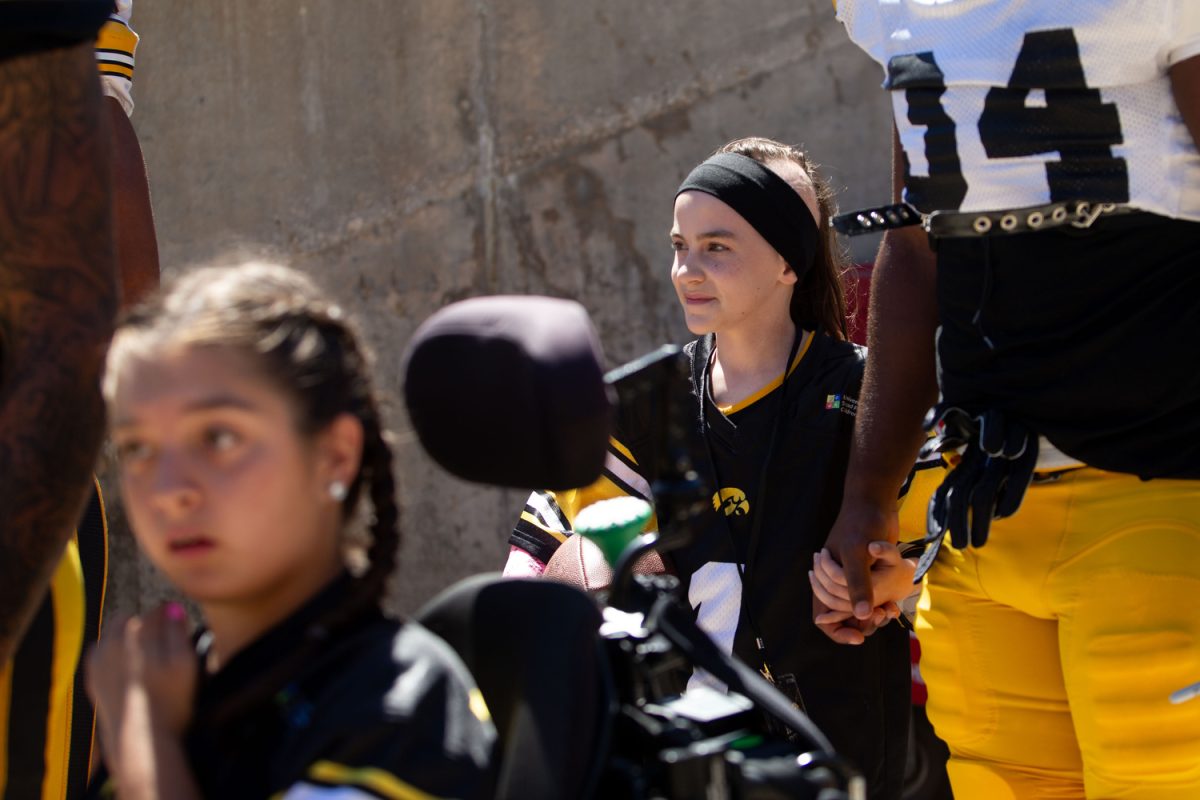Gracelyn Springer was diagnosed with Ewing’s sarcoma, a rare cancer typically found in the leg bones or soft tissue of the chest, abdomen, or limbs, when she was eight years old. But Gracelyn’s tumor was discovered in her head — an extremely rare case that is oftentimes fatal.
Her diagnosis came in November 2020 when her left eye started to cross following a month of headaches, nausea, and vomiting. Her mother, Kelsey, brought her to the local emergency room where a CT scan revealed the mass on her brain.
David Dickens, an oncologist with University of Iowa Health Care who took over Gracelyn’s case toward the end of her treatment, said she was “an exceptional case within our exceptional cases,” which made the decision-making difficult because there was a lack of information on how to approach it.
Gracelyn, of Alburnett, Iowa, underwent brain surgery at the UI Stead Family Children’s Hospital to remove the mass. She then began intense inpatient chemotherapy, which made her sick in the off weeks and required her to live in the hospital for nine months.
For more on Gracelyn’s story, click here:
“You’re scared because it’s a very real possibility that you could lose your child in this situation,” Kelsey said. “Your whole life gets flipped upside down.”
“I was trying to balance making the most of every day I had with Gracelyn, trying to get smiles and take it all in, because at that point you don’t know if you’re going to make it through the battle or not,” added Marty Tope, Gracelyn’s father.
Kelsey and Marty’s support for Gracelyn required making her take an IV and feeding tube when she didn’t want to if it meant saving her life. But throughout the obstacles and difficult moments, Dickens noticed the positivity Gracelyn held onto.
“I’m looking at her at mile 24 and 25 [of a marathon] and what’s going through your mind mentally after you’ve already been through fairly significant physical trauma,” Dickens said. “What was striking to me at that point is that she still had the same kind of attitude and energy that you would expect of somebody who’s just starting out on their treatment.”
During her treatment, Gracelyn experienced hearing loss and was treated for growth hormone deficiency — a condition in which the pituitary gland can’t make enough hormones for her to grow. Additionally, she was diagnosed with cardiomyopathy, a disease that makes it harder for the heart to deliver blood to the body.
While the hospital’s goal is to grow confidence in patients that they can succeed, Dickens noted how Gracelyn walked into the door on the first day with her persistent “I can do this” attitude, even as he discussed her condition and treatment with her parents right in front of her.
“I would say that a lot of children have more adaptive competence than I think we understand or give them credit for,” Dickens said. “Gracelyn is a shining example of a group of children that can do this. Not everybody has it.”
Gracelyn’s cancer is now in remission.
Dickens credits not only the medical staff but also Gracelyn’s parents throughout the process.
“The parents who have children who can adapt like this deserve a lot of credit,” Dickens said. “They’re going through their own stressors, their own fears at the same time that they’re having to engage in the medical decision-making and guide their child through all of their fears.”
Gracelyn, now 10, will serve as the Iowa football Kid Captain in the Hawkeyes’ week one matchup with the Utah State Aggies on Sept. 2.
Although Gracelyn is nervous to be in front of thousands of fans at Kinnick Stadium, she is excited to be on the field, wave to the hospital after the first quarter, and talk to head coach Kirk Ferentz again — whom she met in her tour of the stadium earlier this year.
Kelsey feels Gracelyn serving as Kid Captain will be a great opportunity for her to make new experiences, smile, and have a “zest for life” as she started struggling with anxiety and post-traumatic stress disorder after her treatment.
“From the minute she was born, she had this light about her and this spirit, and the cancer dimmed a little bit of that light,” Kelsey said. “We’re just trying to help her get it back.”
But Gracelyn is the same kid she was two years ago when she first received her diagnosis.
“She’s as spunky as she ever was, looks a bit healthier in general, but her mental attitude didn’t lose a step throughout her treatment,” Dickens said. “I think a lot of us who do this work become inspired by kids like this who can … take their adversity … and teach themselves how to bounce back.”



